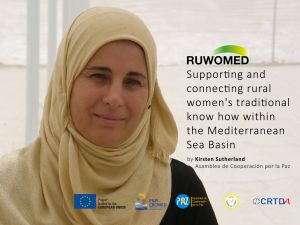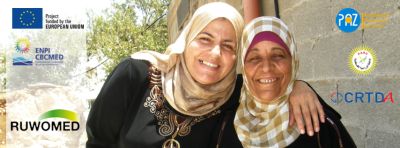Category:RUWOMED
RUWOMED
Context
“Supporting and connecting rural women's traditional know how within the Mediterranean Sea Basin through the promotion of fair products to enhance their economic and social future and to participate towards the achievement of an harmonious development for a good neighbourhood in the region (RUWOMED)”,funded by the ENPI-CBCMED Program, which was promoted by ACPP and implemented by PARC and CRTD-A in the oPt and Lebanon from November 2012 to December 2016.
The overall objective of the project was to promote the socio-economic development of women within the Mediterranean Sea Basin, being the specific objective to develop and strengthen viable economic activities among Palestinian and Lebanese women through a capacity building program, input supports and the promotion of products locally and internationally.
Women’s participation in employment is low in Lebanon and in the Palestinian territories, with women holding less than a quarter of total jobs. The conflict situations have further deteriorated the opportunities of women for engaging in sustainable economic ventures, especially in rural areas. Under the circumstances outlined above, cooperative and micro-entrepreneurial activities in traditional sectors (agro-food, artisanal handicraft) can contribute to poverty alleviation and to women's economic and social empowerment. RUWOMED aims to improve income generating opportunities by setting up and strengthening existing SMEs and women cooperatives to become efficient, viable and sustainable economic entities and ensure a decent source of income for their households.
The RUWOMED project ended in the year 2016 with some of the following achievements:
- Support to 148 women in the West Bank for the start-up of 40 new micro-businesses.
- Support to 50 women in the Gaza Strip for the expansion of 50 micro-businesses.
- Support to a 2nd degree cooperative representing 400 rural women in Lebanon.
- Support to 5 rural women's cooperatives in Lebanon.
- Support to 4 mixed Palestinian-Lebanese-Syrian micro-businesses in Lebanon.
Objectives
Female entrepreneurship accounts for only 15% of female employment in ToP and 16% in Lebanon. In both countries, women wishing to start businesses face multiple challenges, such as lack of experience and training, inadequate sources of finance or restricted access to credit from banks, along with the burden of double workloads, having to ensure that they fulfil reproductive work in addition to coping with the demands of running a business. For these reasons, the main objectives of the projects are:
- Address discrimination in women's access to human, physical, natural, financial and social resources (through trainings, inputs, technical assistances and accompaniment)
- Overcome political, social and gender divisions (bringing groups together such as cooperatives)
- Promote social justice between North and South (fair trade as a way to ensure a levelled playing field for producers in the South)
In order to succeed in the accomplishments of these general goals, it is important to foster and support the following actions and activities:
- Empower rural women economically, socially and politically.
- Build on existing activities and traditional knowledge
- Focusing on collectives rather than individuals
- Adopting fair trade as a tool for socio-economic change
- Promote cross-border people-to-people cooperation
Partnership
- Assembly of Cooperation for Peace - Spain (ACPP)
- Palestinian Agricultural Relief Committees - Palestine (PARC)
- Collective for Research and Training on Development_Action - Palestine (CRTD.A)
- Imam Sadr Foundation - Lebanon (SADR)
- Safadi Foundation - Lebanon (SAFADI)
Lessons learned
✓ The first lesson learned relates to gender as a cross-cutting issue, understanding that promoting women's economic empowerment is not just about generating incomes, but removing the obstacles for women’s full power and agency. It requires a more holistic approach as well as new organisational procedures to solidly reach their interventions.
✓ The design, relevance and effectiveness of the project might be seriously compromised by a long delay between the identification and the implementation of the project, creating frustration and a trust gap among the partners.
✓ On the subject of economic activities, achieving relevant effects is more likely when building them into ongoing initiatives and interests from a bottom-up approach; As for entrepreneurship, it requires a continuous support on managerial and financial aspects, not just training and inputs, as well as follow-up exceeding from just 1-2 years.
✓ A proper identification including all relevant aspects is key for the success of a project, along with a strong and long-term strategic partnership among the organisations involved, with a full coincidence of values, approaches and visions for the initiative, specially when going for transnational projects.
✓ Regarding the scope of the target groups, expanding it too much may affect to the profundity and comprehensiveness of the support and, therefore, to the impact and sustainability of the action. On the other hand, working with similar target groups, economic sectors, contexts and needs is also necessary to maximize the synergies between all the countries involved.
✓ On the topic of fair-trade, exporting local products requires in-depth market assessments and working with consolidated economic activities, capable of strictly fulfil quality criteria and minimum volume of products.
✓ Finally, restrictive and conflict contexts, like the one in the oPt must be carefully assessed when promoting economic activities, and objectives should be adapted to the reality of said contexts.
Useful links to know more about RUWOMED
Pages in category "RUWOMED"
The following 6 pages are in this category, out of 6 total.

